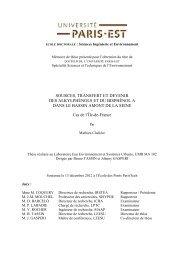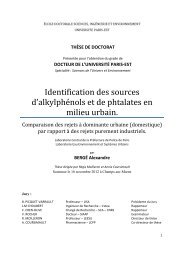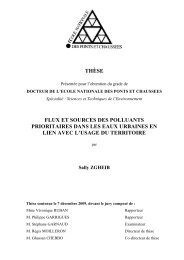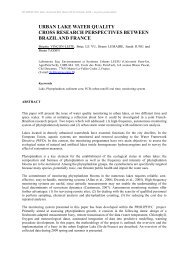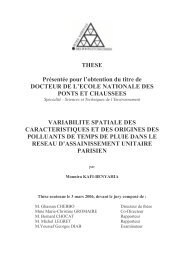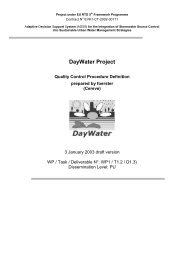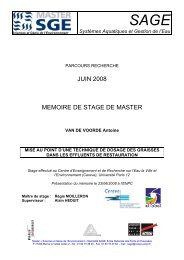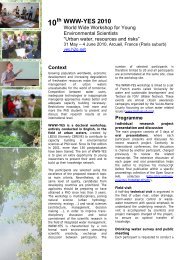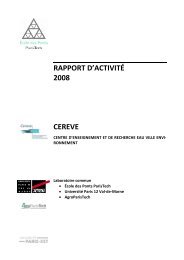View - ResearchGate
View - ResearchGate
View - ResearchGate
Create successful ePaper yourself
Turn your PDF publications into a flip-book with our unique Google optimized e-Paper software.
This work’s aim is to analyse the interaction between local policies of water accessibilitymanagement and international decentralized cooperation and its consequences on urbanterritories organization and water access improvement. Decentralized cooperation refers to theinternational action of local governments in North/South or South/South exchanges andprojects run by international NGO subsidized by local governments.Method and hypothesisOur work will consist in analysing this frame of action where speeches and practices on urbanareas are in perpetual evolution, to see how the actors situated at different levels ofintervention, going of the international to the premises, coordinate their strategies to produce apolicy tending to resolve the imbalance existing in the access to the drinking water on urbansegregated territories (Baron, 2006).It will also ask how local actors appropriate, adapt or throw back imported models so called "ready to manage " by Dubresson (1993), proposed by donors (IMF, World Bank) or localpartners in the North, but their efficiency leaves sceptic some (Damiba, 1996).The research method includes a bibliographic review, official documents analysis, interviewsand questionnaires to relevant actors. The expected result is an evaluation of decentralizedcooperation stakes and above all a discussion on new opportunities of collaboration betweendeveloped countries local governments and those of developing countries in urban servicesimprovement, especially water accessibility.We shall try to report this phenomenon through the literature of these last twenty years on theproblem of the access to the urban services in developing countries, in Africa in particular,their stakes in spatial engineering (Jaglin, 2004) and of reorganization of the urban space insearch of a " good urban governance " (Baron, 2006); but also the modalities of pricedetermination of the water which, for some, has to be made by the market to reflect the realcost of the water and allow an effective allocation of the resources (Thobani, 1995;Camedessus, 2003), whereas for the others (Shiva, 2003) this trade drift is on the base of thedisparities in access to water services which must be considered as a public good (Patrella, on2003; on 2004).Participatory mechanisms will be analysed in their implementation in the context of the dailyways that communities (NGO’s and users association) organize themselves and localgovernments international cooperation practices for water management. The goal is to identifynew ways of collective action and new institutional organization that make it possible tointegrate decentralized cooperation in water issues solution.We shall try to confirm or deny certain assumptions in this work:- Does decentralized cooperation at the same time it allows communities to improve thewater access management is not going to be a way of accentuation of existingdisparities between urban spaces and populations, on territories already characterizedby an mosaic form of organization (Baron, 2006)?- How the decentralized governments, within the support of international cooperation,can improve the participation of the local actors (who have a deeper insight ofpopulations’ difficulties) in establishing a solution to the problems of access to water ina " bottom up " model?Evolution of water sector policiesThe reforms that followed the structural adjustment policies lead to the end of free service inwater and national government’s subsidizes. This change in the management of drinking waterservices in developing countries joined the concerns of the World Bank which considers withinthe framework of Global Water Partnership that water is an economic good that it is necessaryto value and to distribute by taking into account granted investments and profits removed fromequipments.The International Conference on Water and Environment (Dublin 1992) stated: "for all itsdifferent uses, water has an economic value and should be recognized as an economic good".According to this report, "the non-recognition in the past of the economic value of water droveto wasting and harmful practices for the environment of the resource…."It’s on the basis of this principle that developing countries led changes in their water policieswith the establishment of public-private partnerships (PPP).The emergence of a new model of public managementThe "depressed" context of post-Washington consensus (Petiteville, 1995) in developingcountries allowed to local authorities the opportunity to put in profit their new attributions inforeign actions and engage North/South decentralized cooperation relationships.The increasing openness of the international relations to non-governmental actors (after the fallof Berlin Wall) and the broadcasting of decentralization model as well as in northern andsouthern countries participated to the spread of decentralized cooperation [example: FrenchLaw of 1992 that legitimised international actions of local authorities and Britain’s "Localgovernment overseas assistance" Law in 1993]. These legal devices will permit localgovernments to become more emancipated from national authorities and to set up economicstrategies in their field of competence.In Africa, the trend towards decentralization is carried by International organizations such asWorld bank to ensure on one hand a more efficient management of public services and on theother hand to reduce public deficits by transferring at the same moment some revenue andexpenses to local authorities.In a context of spreading of "local governance" concepts (World Bank, on 1992), severalAfrican countries under structural adjustments constraints subscribed to this model heavilyrecommended by international financial partners; that will be the case of Mali (by a law ofFebruary 11th, 1993 determining conditions of the free administration of regions and theirautonomy) and Senegal by the adoption of Local Government Code in 1996.It is important to wonder about the impact of transformations intervened since the early 90's(which are ongoing) both in speeches and practices on the urban territories in developingcountries, especially dealing with water sector.This period (the 90s) is also that of the circulation of a "hybrid" model of public management:the New public management, which associates public and private stakeholders in publicprivatepartnerships (PPP). The generalization of this model is going to follow in theimportance, which was given - at the end of the year’s 80- to the participation of users in costsrecovering of water services and in commons generally. Thus, international community inNew Delhi (1990) and Dublin (1992) conferences on water and environmental stated: The diversification of services (a little for all is better than a lot for little) The association of users and decision-makers at all levels of decision The end of the free services, giving the water an economic value…It’s in this circumstance that at the World Water Forum in Kyoto (2003) public assistance isput at the centre of improvement of water policies, especially in developing countries. Afterthe market regulation and less state model advocated in the 90s shown its limits, it wasWWW-YES 2008, Paris 13 – 16 May 2008 113WWW-YES 2008, Paris 13 – 16 May 2008 114


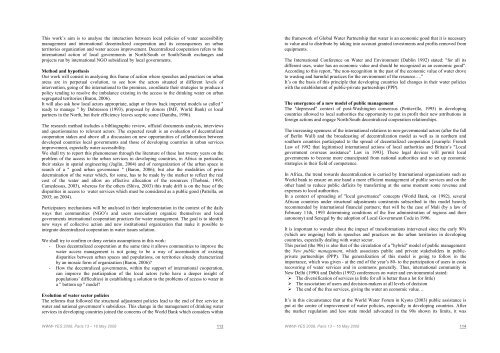
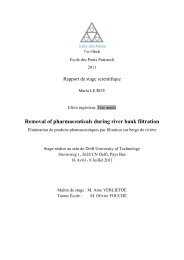
![[pastel-00730831, v1] Incidence des pratiques d'entretien ... - LEESU](https://img.yumpu.com/50938896/1/184x260/pastel-00730831-v1-incidence-des-pratiques-dentretien-leesu.jpg?quality=85)
